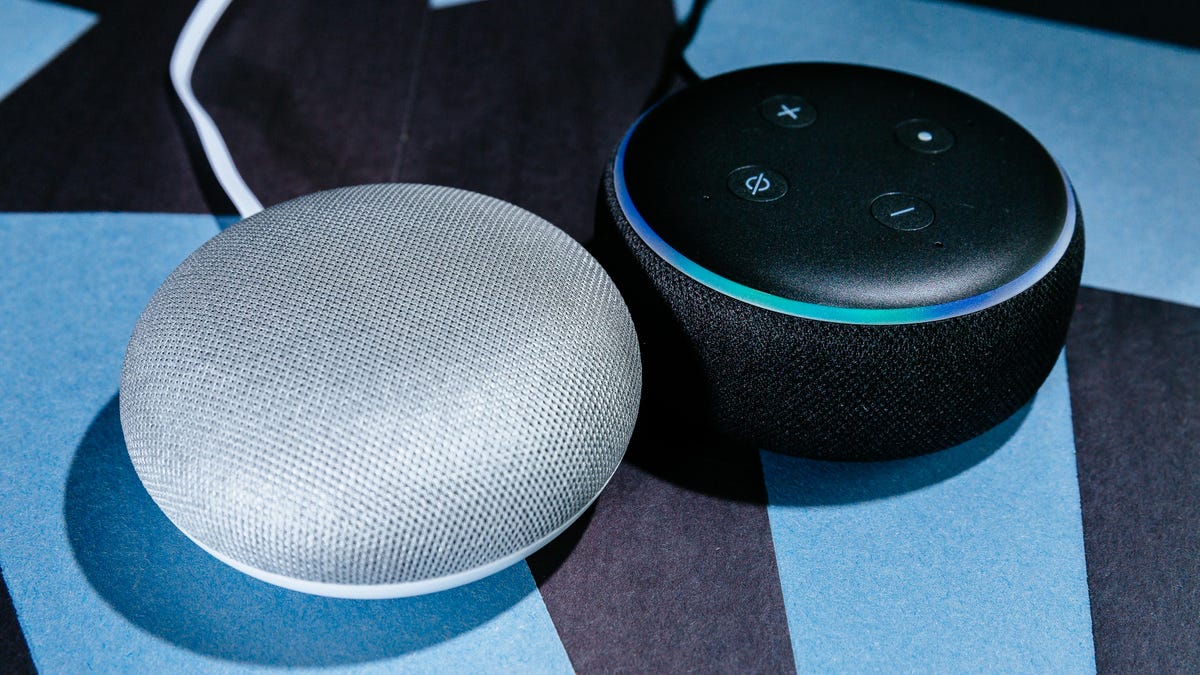 Why You Can Trust CNET
Why You Can Trust CNET Apple, Amazon, Google, others want to create a new standard for smart home tech
The Connected Home over IP project aims to make your smart home devices work better together.

Google's Home Mini, left, and Amazon's Echo Dot are two popular smart speakers.
Apple , Amazon , Google and the Zigbee Alliance said Wednesday they're forming a working group to develop and promote a new standard for smart home products. The goal of the group, called Connected Home over IP, is to "simplify development for manufacturers and increase compatibility for consumers."
The new smart home standard will be built upon IP, or Internet Protocol. In a blog post, Google said using IP will enable "end-to-end, private and secure communication among smart devices, mobile apps , and cloud services." Security will be a fundamental design tenet of the new protocol, according to the group.
"The project intends to use contributions from market-tested smart home technologies from Amazon, Apple, Google, Zigbee Alliance, and others," the project's website reads. "The decision to leverage these technologies is expected to accelerate the development of the protocol, and deliver benefits to manufacturers and consumers faster."
The draw for Amazon, Apple and Google is that each wants to make it as easy as possible to connect third-party smart devices with its respective connected home platform -- Alexa, Apple HomeKit and Google Assistant, respectively. For each, an open-source industry group with the manufacturers of devices like those is an opportunity to move the needle.
Amazon, for instance, introduced "Frustration-Free Setup" last year, which is software that device makers can use to ensure that their gadgets sync with Alexa in near-automatic fashion as soon as they first get plugged in. With a hand on the steering wheel for a new, industrywide standard, Amazon may be able to steer manufacturers in that sort of direction. As for Apple, having a hand in the development of a new standard may help ensure some level of support for its iOS-based HomeKit software.
Meanwhile, Google faced criticism earlier this year for the clunky way that it transitioned users and their devices from the Works with Nest open software platform to the new Works with Google Assistant platform, an irreversible change that rendered certain third-party integrations inoperable. Chipping in with an open-source, industrywide working group might help rebut the perception that Google wants a more walled garden for its user base.
On its face, the project is just the latest in a long list of industry attempts to bring order to the chaotic mish-mash of standards and protocols that make smart homes smart. Then again, there's been some real progress on that front in recent years, largely as a result of big players like Amazon, Apple and Google making big plays in the effort to develop cohesive smart home ecosystems that make sense to consumers.
Whether or not the group can create something practical that benefits all three of those platforms -- or that creates connective tissue between them, even -- remains to be seen, but that definitely seems to be the idea. When the new standard arrives, the plan is for it to work over top of the ways smart home devices are already designed to connect with one another.
"The goal of the first specification release will be Wi-Fi, up to and including 802.11ax (aka Wi-Fi 6); Thread over 802.15.4-2006 at 2.4GHz; and IP implementations for Bluetooth Low Energy versions 4.1, 4.2, and 5.0 for the network and physical wireless protocols," the project's website reads.
Zigbee Alliance board member companies that are expected to join and contribute to the project include Ikea, Legrand, NXP Semiconductors, Resideo, Samsung SmartThings, Schneider Electric, Signify (Philips Hue), Silicon Labs, Somfy and Wulian.
Originally published Dec. 18, 6:13 a.m. PT.
Update, 9:47 a.m.: Adds more information on the Connected Home over IP project.
CNET Holiday Gift Guide
- Best laptops and desktops to give as holiday gifts in 2020
- The best headphone gifts for the holidays
- Best Bluetooth wireless speaker to blast for 2020
- Best TV and streamer gifts for the holidays
- The best gifts to get healthy in 2021
- Give the gift of a better, faster router for the holidays
- Best gaming gifts for the holiday season 2020
- Best gaming accessories to give as holiday gifts
- Best 2020 phones to give as gifts: iPhone 12, Galaxy S20 FE, Pixel 4A 5G and more
- Best soundbars and home audio for the holidays
- The best smart home gifts of 2020
- Best gifts for working at home in 2020
- Best toys for 2020
- Best gifts for Mom in 2020
- Best gifts for Dad in 2020



